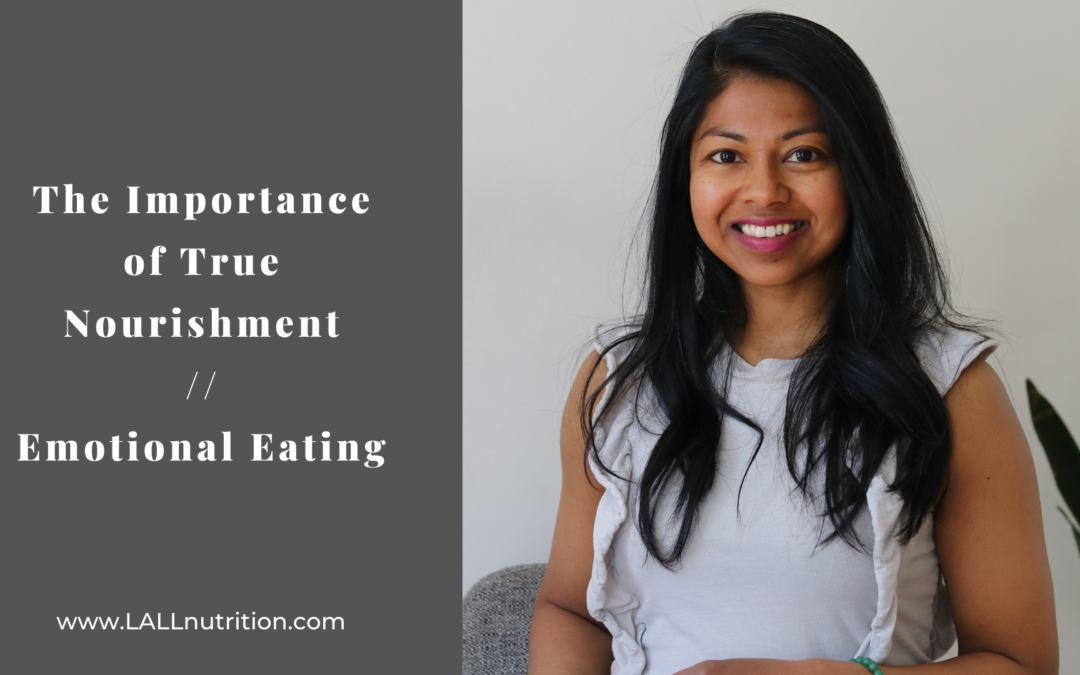Hello love,
Today I wanted to share with you more about true nourishment and why It’s important for emotional eaters and chronic dieters. For the longest time I struggled with emotional eating and chronic dieting. I thought dieting was a way to control my hunger, my body, and to be healthy. That everything in the diet knew what my body needed.
It was really externalized. As I went through my emotional eating journey and moved away from diets I started to tune into what my body needed. I realized that we give our power away to diets and all of these things we think we ‘should’ do. It’s ingrained in our culture and society. We don’t have a starting point with our bodies. We are taught from a young age that we should eat at a certain time, how much we should eat, what types of foods, etc.
As an emotional eater you use food to cope with your emotions which complicates your relationship to food even more.
Today I wanted to share more about true nourishment. This is moving away from the noise of the dieting world and coming back to your body. When I work with clients, I have a structure that we flow from. It’s all about connecting you back to your body and knowing when you need to eat, being really strategic about digestion and the food that you’re eating.
But it’s not a diet.
It’s not something external to you.
You’re always asking inwards to yourself. This is the way I teach clients to start truly nourishing themselves. After we’ve been on so many diets for so long we don’t know how to truly nourish our bodies, we don’t even know what that looks like.
I want to share with you what that might look like and some new perspectives you can take in and start implementing yourself.
What is true nourishment?
I combine true nourishment along with strategic digestion. So the thing about nourishing our bodies, it’s not just dependent on the types of foods we’re eating. It’s also dependent on how we’re digesting absorbing, assimilating food as well as eliminating them.
True nourishment and strategic digestion go hand in hand. We’re nourishing our bodies by putting in amazing food and making sure they digest. With clients there is a structure that we flow from. I recommend mostly fruits and vegetables that are going to digest really well in the body in combination with other whole foods. The way it’s structured in my program is eating in a way optimizing digestion.
Eating When Truly Hungry
We are eating when we are truly hungry versus emotionally hungry. If we’re eating whenever we’re emotionally hungry as emotional eaters, we’re going to be eating when we’re our body is not physically ready to take in food.
And so why is that important?
We need our body to be in digestion mode because we have enzymes and acids in our stomach that are secreted when we’re ready to eat to help break down our food further after we’ve chewed it.
If we’re emotionally eating, our body is not hungry physically so the body doesn’t produce acid and enzymes.
This creates digestive distress in the body -> which impacts our digestion -> impacts our brain via the gut-brain axis -> impacts our mood -> makes us use food to cope with poor mood.
So we want to start off with truly nourishing the body and making sure we’re digesting food. So starting off with true hunger is important.
Types of Food
The second thing is we want to look at the types of foods we’re eating.
Are they agreeing with our body?
Are we feeling light after a meal?
Do we feel like energized or sluggish?
What I do with clients is I incorporate different digestive principles, food combining and just making sure they’re digesting their foods and just optimizing the way a meal looks. So there are certain proportions to a meal in order for it to be satisfying to our hunger on multiple levels.
You want a meal that’s satisfying to you on a
-physical level, so it’s physically filling your stomach
-energetically so it has enough calories
-it has enough micronutrients and
-it tastes amazing.
So a meal that’s optimized for that is going to satiate you and make you feel good. So if you miss those four qualities and you’re eating a meal that is doesn’t have enough calories (for example), let’s say you might be eating a large amount of vegetables, you’re not going to feel satisfied. You’ll need to add in some denser foods. So you want to make sure that meal is portioned correctly.
Feeling Satisfied
Something that diet do not emphasize is feeling satisfied. If anything, they’re restricting you.
Because of this many of my clients have difficulty at first eating more. Even when I give them leeway to eat an abundance of food they still thinking about portions and that they need a smaller plate.
It’s liberating when I show them in my program, to eat in a way that you actually feel satisfied. You don’t have to worry about eating too much. You’re tuning into the body and satisfying hunger in the ways I mentioned above. Yes, you might need more food and that’s OK.
There’s nothing bad that’s going to happen but that’s what we’ve been trained to think, that something bad is going to happen if we eat too much. I’m not saying go out and eat whatever you want. You have to learn about your body and structure meals according to how you digest food so that your meal is going to satisfy you and nourish your body. Diets don’t teach us is that we can have abundance around food.
How’s your digestion?
How do you feel after a meal? For example, I teach clients is not to drink water with your meals because that’s going to impact your digestion. These little keys about digestion, they’re not included in diets. It’s just “eat this and this”. Digestion is as important as the ingredients in a meal. It’s this combination that we don’t talk about and diets don’t address this at all.
Diets are not looking at you deeply nourishing your body. The focus is about the amount of calories and types of foods, but how is it in your body?
How is it helping your digestion?
How is it actually nourishing your body?
And do you feel energized after you’ve eaten it?
Are you starving?
Another big thing with diets is that they are energetically sufficient. We are on the search for calories and our brain goes into survival mode. We’re chronically looking for food because we keep limiting the amount of food we’re having or the portions of foods we’re having.
Our bodies not being deeply nourished. That leads to binges because your body is starved for nutrition. You can’t even think about what you’re eating and start bingeing which is a little bit different than emotional eating.
They’re both connected but I’m going to distinguish them. If you’re starving your brain, then of course you’re going to want to eat more later in the day or have binges more regularly because you’re not giving yourself enough food.
Once you nourish your body you can identify the emotional eating. This is why this is the first phase of my program you start with deeply nourishing your body, then you can get into the emotions underneath emotional eating.
Summary
I wanted to contrast dieting with true nourishment and why true nourishment is important. I feel it’s not talked about when we are looking at emotional eating. But I believe in a holistic approach. This is what helped me move past my emotional eating. I nourished my body, honoured my body’s needs and then moved through the emotions and other lifestyle factors to move past emotional eating and ditch dieting.
If you have any questions, leave them below. If what I’m saying is resonating with you and you need more guidance and support, I would love to invite you to apply to The Emotional Eating Evolution Program. This program encompasses what I have talked about here and even more to help you move past your emotional eating and to ditch dieting.
To true nourishment,
Michelle Lall
Certified Holistic Nutritionist + Emotional Eating Expert


